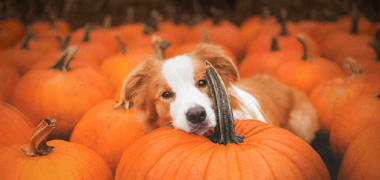Pumpkins are probably the mascot of the autumn. Whether it’s your front doorstep, spice lattes or your pies, these orange bundles of joy are everywhere at this time of the year. While you might have to wait for the season to enjoy your pumpkin-flavored treats, but for your pet pumpkin treats are available on the menu all year round. Let your pet enjoy the goodness of pumpkin, as it can be a tasty and nutritious treat for pets.
An interesting fact: In scientific terms pumpkins are classified as a true berry fruit, while we refer them as a vegetable.
Pumpkins are rich in vitamins, fibers, antioxidants, and minerals, but low in fat, calories and sodium. Pumpkin seeds, leaves, and juices all pack a powerful nutritional punch. They are rumored to be a great remedy for your pet’s upset stomach, skin, eyes, shiny coat and strong immune system.
The high water and fiber in the pumpkin helps to add bulk and softens the stool. Pumpkin acts as a natural laxative and making the stool easier to pass. According to PetMD, pet obesity can cause heart disease, high blood pressure, breathing difficulty and many other damaging conditions. Pumpkin promotes a sense of fullness and enhances weight loss in your pet by reducing overall caloric intake.
How to feed pumpkins to your pet?
You can feed pumpkin to your pets in different ways, including freshly cooked, pre-cooked in a can, or dehydrated. Freshly cooked pumpkins are great for your pets if you prefer local and ideally organic food. However, it takes some time and effort to prepare a freshly cooked pumpkin. As, it needs to be carved, cleaned, cooked and pureed/mashed before it’s fed to your pet. If you don't want to go through the hassle of preparing freshly cooked pumpkin, then you can purchase a canned or dehydrated version for your pet.
A single serving of canned pumpkin contains 90% water and nearly seven grams of dietary fiber. While fresh pumpkin contains more water and less fiber per volume; approximately three grams per one cup serving. This makes choosing a canned pumpkin for your pet, a better option than preparing freshly-cooked variety. But, make sure you don't feed pumpkin pie filling as it contains fat, sugar, and other ingredients which can upset your pet's digestive tract. Additionally, dehydrated pumpkin is also great for on-the-go pets and owners. It’s simple to mix with any moist food or can be hydrated with water or other liquids like low-sodium meat broth.
Don’t give your pet a lot of it — excessive pumpkins can have a negative effect on your pet. A couple of teaspoons a day for small pets, or a couple of tablespoons for adult pets, can keep them right on track. However, consult with your veterinarian before you start incorporating pumpkin into your pet's diet.
Can you feed pumpkin seed to your pet?
Pumpkin seeds can be fed as an all natural, delicious snack to your pet.
It contains omega 3 fatty acids, which have beneficial anti-inflammatory effects. Additionally, it contains the amino acid called cucurbitin, which works as an effective deworming agent against the intestinal parasites and tapeworms. Pumpkin seeds have also been found to benefit those with mild prostatic hyperplasia and kidney stone.
Pumpkin seeds can be fed as a whole treat to your pet. If your pet doesn't prefer whole seed, you can crush and grind up and add it to your pet's meals. Don’t feed your pet the salted pumpkin seeds; find some unsalted organic seeds instead.The unsalted organic seeds help to expel the worms and a generous portion can be fed as a wholesome treat.
What are the Side Effects of Pumpkin on Pets?
Feeding too much pumpkin to pets either fresh, canned or otherwise can actually cause undesirable digestive problems due to consuming too much fiber too fast. Even if it’s healthy, when you feed something new to your pet, simply start with small amounts. Starting slow helps to avoid undesirable effects and find out how your pet reacts to the new dietary addition.
Keep calm and Enjoy the Pumpkin before it's gone!


